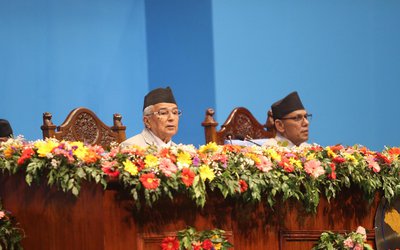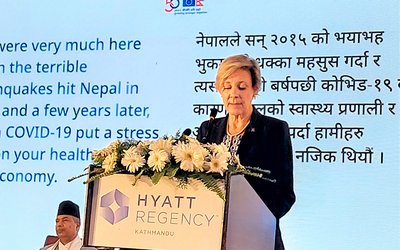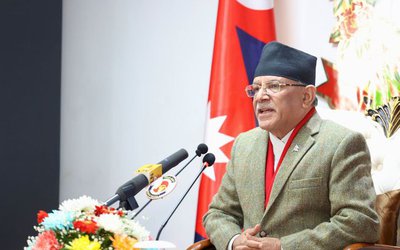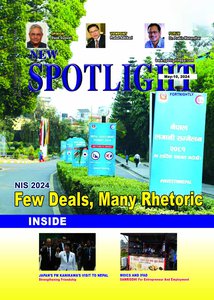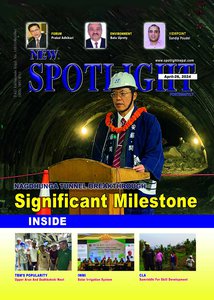Intellect is considered as the highest knowing faculty of mind. It is a combination of reason and discriminating faculty. It moves step by step, but does not make the next step unless it is sure that it is going to land on a firm ground; it does not move by leaps and bounds. Intellect functions on the basis of gathered data without which it becomes useless. It concludes on the basis of limited tools of knowledge such as deductions, inferences etc, and so it sees only a limited part of the truth, not the whole truth. The whole truth is our deepest being behind the vesture of body, life, mind and intellect, …but at the intellectual level we grope with external vision of things,- Radhakrishnan. Intellectual knowledge is still imperfect as we are not yet free from logic, but it accepts the existence of a higher intelligence Since intellect bases itself on objectively verifiable proofs which cannot always be verified directly, it acts as a very crude, partial and insufficient guide on our path to the Truth. But since it accepts the existence of a higher intelligence, it does orient us towards the infinite, and thereby enables us to move in the right direction. It cannot, however, reveal the divinity residing in us, because it cannot go beyond itself without an internal aid, say, intuition which constitutes an element of the higher intelligence. At its best, it can show us the path through finite to the infinite, to the absolute. It can provide an idea of the higher existence, but cannot fully grasp the underlying reality. We can be the master of the intellect, but we cannot transcend it except through the aid of higher Intelligence. Highly intellectual persons seem to have difficulty in transcending the intellectual limitations which is something like trying to lift oneself by holding one’s own shoe laces whereas saints have no difficulty here. A. Einstein was one of the greatest intellectual personalities, but he was also a seer, and intellect never became a problem for him, but many well known Western philosophers i.e. Hegel, Marx, Nietzsche, James and a few others could not go beyond the intellect or beyond the external vision of things. Even the well known Eastern thinker J. Krishnamurti is sometimes considered as the master of intellect.
The intellectual reason is not the only means of knowledge. All our actions, instincts, impulses, sensations, imaginations, perceptions and will constitute the instruments of knowledge. But it is only the intellectual reason that can free itself from the work or action, stand back to analyze its own workings disinterestedly without being involved in the process. From this point of view, intellect is superior to rational thinking, although the relationship is just the opposite in the West as stressed ay by Brunton. The rest of other instruments of knowledge are not endowed with self-reflecting capacity and, therefore, cannot work independently. They jump to action without being conscious of their action from the subconscious levels of their existence once the appropriate conditions for their appearance are created. We know how uncontrolled emotions can harm us. The reason understands itself, but not what is beyond it. The reason is then completely true to itself when it understands itself. Within this limit, it is unlikely to give in to anything that is not rational. It can, however, see beyond itself, but this seeing falls short of true understanding. It thus realizes that there is something beyond its horizon and thus accepts its limitations but cannot go beyond these limitations unaided. One can say that intellectual reason is then dissatisfied with itself, but can do nothing. In fact, intellectual reason cannot explain the mental phenomena associated, say, with emotions, imagination, impulses, ethical and aesthetic needs etc., and a number of other problems of life. The intellectual reason cannot provide necessary answer to the question: whether existence can be explained on the powers of intellectual reason alone?
If we exclude the spiritual aspect of life, there are two distinct domains of existence: one is material and the other vital. Intellectual reason seems to work comfortably with the material existence, but it seems utterly inadequate to explain life; one of the reasons being that the imperfect human reason has no self-sufficient light and so cannot guide itself through the labyrinth of life. The world of life is beyond the control of reason i.e. reason cannot bridge the gulf between the two domains. Life itself is then involved in the running of life. As said by Sri Aurobindo life escapes from the formulas and systems which our reason labors to impose on it. Lately, it has been realized that only a profounder and wider power of knowledge that transcends intellectual reason can bridge the gap. While the intricacies of life cannot be grasped through reason and other faculties (instinct, impulses, imagination etc.) which are below it, they can be grasped through the illuminating faculties such as revelations, inspirations, insights, intuitions etc. Reason understands itself through reason because it projects itself only in terms of rational thoughts. Reason simply projects its thoughts, while the other higher faculties reside in the deeper depths of our heart and mind as well as in the secrete depth of our existence. They have their origin somewhere higher than in our ordinary existence and come to life when we become able to establish a connection with that Self. We start our intuitive journey with open heart and mind; we explore and accept what opens itself to us without any preconceived ideas or thoughts. When the connection grows stronger and surer, the illuminating faculties come down to us from higher levels of our existence, the Self for example, and, therefore, do not recognize any rational limitations. Out of these, intuition is perhaps the most important and more directly accessible faculty as it is the one that can intuit this connection.
The limitations of the intellect become starkly obvious when it has to deal with religious and psychological experiences of man. In a sense, we go through these experiences, but cannot understand the language used to explain these experiences. The intellect has then to simply give in and submit to something higher than itself i.e. to the spirit, which just knows without the help of words or thought. It can lead to the very gate of knowledge, but stops there saying:
“I have tried to give you the truth in a form and system which will make it intelligible to you; if you are intellectually convinced or attracted you can now seek the real knowledge, but you must seek it by other means which are beyond my province.” – Aurobindo. Here the other means includes intuition that helps us to go beyond the intellect.
Reason is widely acknowledged as a rival of faith. Reason is likely to pronounce many of the religious practices and principles as superstitious or a mystical nonsense as reason may not find objective proofs because the proofs may be of subtle nature and outside the limits of reason. Omitting for the time being, many drawbacks associated with religion, it seems that religion has been able to convince many that there are at least some fields into which reason cannot extend itself but with which our heart has natural but strong affinity. But when reason is put forward to support a religion, it has tended to patronize religion unnecessarily by explaining away the incongruities or by rejecting to introduce necessary corrections and purifications in religion. In both the cases, we miss the point that both of them have an element that does not change with time. The mistake is that we continue to support the element that is of time forgetting that the element that is not of time is more important.
Of course, reason has indeed been a part of religion and religious experiences or practices. Reason, for example, in collaboration with philosophy, has been instrumental in abolishing outdated religious traditions and beliefs. Although reason cannot explain or set bounds to spiritual experiences, it has been used positively to explain and communicate the truths and experiences to the rational or intellectual parts of man. In this endeavor, reason necessarily has to take recourse to philosophy simply because reason cannot leave itself behind unaided. This role of reason is gaining importance now, because mankind or better perhaps the intellect of the mankind, after quite a long duration of straying away, is returning home in search of the Divine with receptive mind and an open heart ready to incorporate, integrate and/or accept what the age has to offer for our self-improvement and self-illumination. Reason may have to do some thinking at least for the home comers and present the experiences in ways that are accessible to them and proper to their intellect, logical reasoning, rational experiences, inferences etc., and express them in such forms, sequences and languages as are appealing and intelligible to them.
One very important observation related both to reason and religion is that true knowledge cannot be achieved if we stick to a particular idea and particular end from the beginning. As we then cast the truth into the moulds of our preconceived ideas, and by doing so reject or deny all that goes against the ideas. We are then imprisoned by our interests, concepts, prejudices, and passions etc. and cannot act freely and independently. In fact, these mental tendencies constitute the irrationalities of the human mind and obstruct free thinking. However, this is often the case when we let ourselves be governed and carried away by lesser ideals, instincts, impulses, prejudices etc., The true nature of reason is to seek knowledge objectively, for the sake of knowledge. Destruction of negative attributes i.e. our desires, reactions, prejudices etc, from within and through our conduct and conduct alone is considered the first step in this direction. It is to be noted that there is always some chance for us, even for those who consider themselves rationalists or intelectuals, to be carried away by the prevalent ideas, ideals or traditions as they contain some grain of truth. This observation is found to be more applicable in the case of religion compared to that of science, because religion often expresses itself in more subtler and idealistic terms, but then the truth is always partial, incomplete and temporary and not the whole. It is because of their partial truths and the associated preconceived ideals have been able to have their sway for quite some time even after they have become obsolete. Some traditions, for example, continue to capture the common mind long after they have proved dead wood because the mental residue that was deposited during the course of hundreds of years needs time to be cleaned.
The mental man is not intended to grasp the whole truth all at once; he can only move towards the truth through a succession of observations and experiences, self-enlarging reflections, contemplations, self-transcending and continuous build-up of faith, conviction and experiences. The process also involves his evolution in terms of the horizon of his reason and vision as well as his self-improvement and self-enlargement. As earlier indicated by Swam Vivekananda and others it is possible for a man to undergo these changes, to destroy or modify what constituted his past, to progress, grow and enlarge himself even within a single life span.
An important point that has to be made clear here is that reason could be the worst enemy of truth if it does not know its own errors. Truth is simply too infinite for reason. It cannot, for example, judge the role of love, compassion or even that of faith in our search for the truth. Higher levels of instruments have to be utilized, and intuition is such an instrument, which establishes the first direct contact with the Self.

Prof. Dr. Akal Bahadur Singh
Prof. Dr. Singh was one of the founding Pragya in the old pre-1990 RONAST. Recently he has been spending much of his time thinking about the relationship between science and spirituality.
- Sensations, Perceptions And Concentrations
- May 02, 2024
- Insights And Inspirations
- Oct 01, 2023
- Reason, Understanding And Knowledge
- Jul 25, 2023
- Ideas, Actions And Experiences
- Sep 07, 2022
- Unity In Diversity
- Aug 16, 2022

